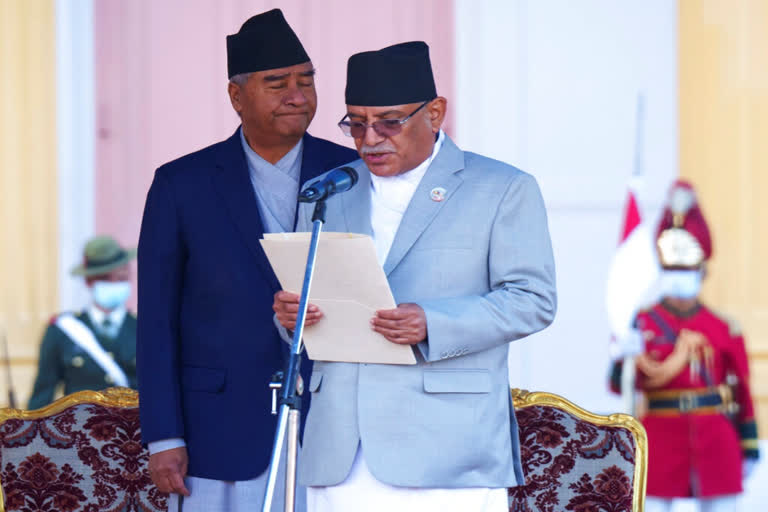It was a bewildered and worried Delhi that greeted the news of Pushpa Kamal Dahal or Prachanda (the fearsome one) dumping Sher Bahadur Deuba’s Nepali Congress alliance and rejoining K P Sharma Oli led CPN (UML) to emerge as the Himalayan nation’s PM. It’s a “setback to India” claimed a former Indian Ambassador to Kathmandu. It is an indication that India has lost political influence, he said.
Ever since the results of the elections were declared with no alliance really getting a majority, it was a topic of intense debate in Nepal, echoes of which were heard in Delhi also - why is India losing influence in Kathmandu? In fact, US and China jostle for the top spots and not New Delhi. In Prachanda’s elevation as the PM, has China beaten back US and India?
Though it is obvious to many, developments in the last few months suggest that both Oli and Prachanda have been softened by Indian agencies and people associated with the Rashtriya Swayamsevak Sangh (RSS), which is very active in Kathmandu. It may be recalled that in 2015, the then Indian foreign secretary, S Jaishankar, had displayed deep resentment over the new secular constitution.
The Nepalese leadership, which was led by Maoists had claimed that they were being persuaded to declare the country 'a Hindu state', which they summarily rejected. At the face of it, New Delhi was not really expecting this sudden change and was sanguine in the belief that it had got all the ducks in a row with Deuba led alliance comprising Prachanda’s breakaway communist party, pro-West Rashtriya Swantatra Party (RSP) and the pro- Durbar Prajatantra Party pipping a seemingly pro-China, KP Sharma Oli led alliance.
Nepal, which is a cockpit of intrigue and power play in the region, had caused disquiet in New Delhi when a manifestly anti-Indian, Sharma, was the PM. The election results send an unequivocal message that there had been a shift in the balance of power in the landlocked country and now the United States of America was running the show here.
This impression was buttressed by the fact that a new pro-West party headed by a TV anchor, Rabi Lamichanne, not just managed to win 20 seats (including from proportional presentation), but also emerged as a kingmaker. Besides, the US Ambassador was visibly quite busy trying to cobble together an alliance to keep the pro-Chinese grouping at bay.
In the new government led by Prachanda, Lamichanne, whose party fought on the issue of fighting corruption is the deputy Prime Minister and Home minister of the country. He represents a generation of Nepalis that have nothing to do with India and look for inspiration from the West. It is for this reason, observers claim that Lamichanne has powerful backers.
Also read: Look Back 2022 in Nepal: Country witnessed dramatically turned political rivals into allies
This interference by big powers in Nepal affairs is unusual, according to Nepal watchers. For long, there was near unanimity in both, US and China, that India should have its sway in its own backyard. Sources in Washington never shied away from stating that India will serve their interest if it is in control of affairs in Kathmandu.
Briefly, China conveyed to India that it was not in contention with India in the affairs of Nepal as long as its interests were being protected. And that meant not allowing their land to be used for anti-China activities of the Tibetan Buddhist refugees. Then things changed dramatically after the relationship soured between Kathmandu and New Delhi after KP Sharma Oli took over as the PM.
Indian government under PM Modi had antagonized the local people after the devastating earthquake that hit the Himalayan nation as there was an attempt to take more credit than he deserved. Modi was also prevented by the Maoist leadership from locating Nepal in the Hindutva iconography.
Accompanied by a series of unfortunate events saw hostility rise between the two neighbours, with India siding with protestors in Madhes region and blockading the road that ferried oil, cooking gas, and other materials. This move left deep scars in the psyche of the Nepalese who have consciously begun to reduce their dependence on India.
Taking advantage of this souring of relationship, the Chinese cobbled together a unity amongst the Maoists-Prachanda and KP Sharma Oli. Their aggressive Ambassador worked herself to a standstill to build a hold on Nepal. "Usually, Indian ambassadors enjoyed this privilege to manage affairs in Nepal, but Chinese beat us at this game," reminisced a retired diplomat.
India expressed fears about how Nepal had agreed to join China’s much-vaunted, Belt and Road Initiative (BRI). It leavened an impression that China’s railway network will eventually find its way to India as that way it would become viable. New Delhi had refused to do anything with BRI, and it was embarrassing and unsettling for it when its closest ally and neighbour, Nepal, chose to be part of this initiative.
When Oli was ousted and Deuba government was installed, his government agreed to the Millennium Challenge Corporation (MCC), which was presented as a counterpoint to BRI. How will the new government conduct itself? Will it be pro-Chinese and antagonize India and the US? Long before the change took place in Kathmandu, there were reports that the intermediaries from RSS were working closely with K P Sharma and Prachanda. Though a Maoist, Sharma was taking part in Hindu rituals. If that is indeed true, then wait for more surprises from this cockpit of intrigue?



